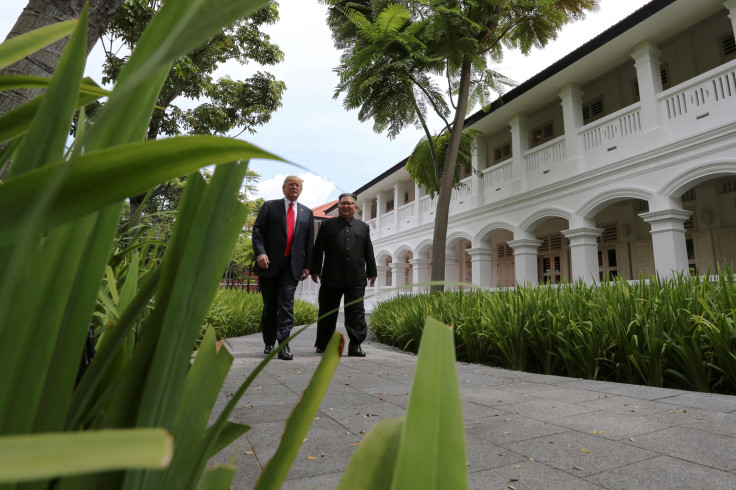Pentagon Weighs Future Of Korea Drills After Trump Nixes 'War Games'

The U.S. military on Wednesday was looking at ways to ensure American forces in South Korea could still be fully trained and ready, a day after President Donald Trump suspended military exercises in a surprise concession to North Korea.
U.S. officials said it was unclear what types of training involving U.S. and South Korean troops might cross into Trump's now forbidden zone of "war games." But big, joint U.S.-South Korean exercises appeared off-limits under the new guidance.
"Make no mistake, we are going to maintain the readiness of our forces in South Korea," said one U.S. official, speaking on condition of anonymity. The official acknowledged, however, it was still not certain how that was going to happen.
Trump announced the end to the drills on Tuesday following his historic summit with North Korean leader Kim Jong Un in Singapore, calling exercises expensive and "provocative" - echoing a North Korean criticism that the United States had long rejected.
U.S. Secretary of State Mike Pompeo, speaking to a small group of reporters in Seoul on Wednesday, said Trump was unambiguous that the exercises would be frozen as long as there were productive, good-faith negotiations with Pyongyang.
"His intention here was to put us in a place where we get the opportunity to have productive conversations connected to the denuclearization of North Korea," Pompeo said.
The decision to halt military exercises in South Korea has bewildered many current and former U.S. defense officials, who only learned about it when Trump made his remarks.
They fear it could erode the readiness of U.S. troops in one of the world's most sensitive military flashpoints who have long prided themselves on being able to "fight tonight," thanks to heightened training.
Critics, including in Congress, warn that an end to joint U.S.-South Korean drills could also erode the effectiveness of the military alliance between Washington and Seoul. They also balked at Trump's justification that cutting drills would save money.
WHAT TRAINING WILL BE ALLOWED?
A White House National Security Council official said some types of training would continue even after Trump's announcement.
"There is absolutely no change to our commitment to the defense of South Korea," the official said, speaking on condition of anonymity, adding: "Regular readiness training and training exchanges will continue."
U.S. Democratic Representative Ted Lieu, a former active-duty Air Force officer now in the Reserves, questioned how the military would differentiate between military exercises and "regular readiness training." "They're part and parcel of the same thing," said Lieu, who sits on the House of Representatives Foreign Affairs Committee.
As the dust settled, it appeared increasingly unlikely that U.S. troops would be able to proceed with the annual Exercise Ulchi Freedom Guardian, a largely computer-simulated but large-scale exercise in South Korea that last took place in August 2017 and involved 17,500 U.S. forces joining South Korean troops.
Forces from Australia, Canada, Colombia, Denmark, New Zealand, the Netherlands and Britain also participated.
Republican Representative Mac Thornberry, the chairman of the House Armed Services Committee, said he believed the August drill would be affected.
"My understanding is the intention is to suspend the large joint training exercises," Thornberry said, adding that he supported the Trump administration's effort to give the negotiations a chance and "put North Korea to the test."
The traditional U.S. calendar for other major drills would not pick up again until next spring, officials say. That could give diplomats and military planners time.
The U.S.-South Korean exercise calendar hits a high point every spring with the Foal Eagle and Max Thunder drills, which both wrapped up last month.
Max Thunder's air combat exercises so unnerved North Korea that it issued threatening statements that nearly scuttled the summit. Foal Eagle is designed to simulate war scenarios and involves ground, air, naval and special operations forces.
One possibility could be carrying out some joint training overseas - beyond South Korea. Within the U.S. military's Pacific Command, there are plenty of regular exercise opportunities.
Japanese Defense Minister Itsunori Onodera said on Wednesday that his country's military exercises with the United States would continue, calling them vital.
Lieu dismissed the idea of holding the drills in Japan or Guam since the terrain would not properly simulate a conflict with North Korea.
"It would be sort of bizarre because Guam doesn't look like North Korea. Neither does Japan," he said. "So, it's not clear what the utility would be."
© Copyright Thomson Reuters 2024. All rights reserved.




















